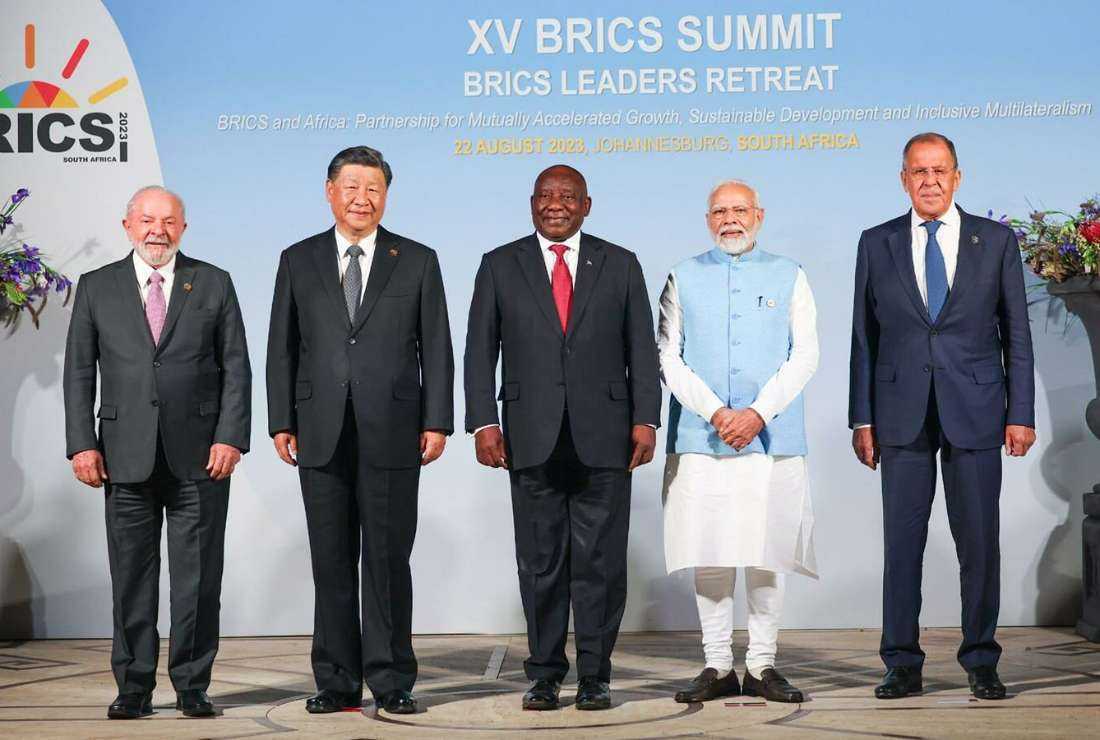
This handout photograph, taken and released by the Russian Foreign Ministry on August 22, 2023, shows (L-R) Brazil's President Luiz Inacio Lula da Silva, China's President Xi Jinping, South Africa's President Cyril Ramaphosa, India's Prime Minister Narendra Modi and Russia's Foreign Minister Sergei Lavrov pose for a group photo during the BRICS Business Forum in Johannesburg. (Photo: AFP)
It all began in November 2001 when Jim O’Neill of the investment bank Goldman Sachs published the paper “Building Better Global Economic BRICs.”
He predicted an increase in the influence on global GDP of the then BRIC states (an acronym for Brazil, Russia, India and China), especially China, thus emphasizing the need for a global reorganization of the economy and politics.
O’Neill added that by 2031 the BRIC states would catch up with, or even surpass, the economic output of the G7 states. In fact, according to estimates by the International Monetary Fund (IMF), as early as 2023 the BRIC GDP, expressed in dollars, at 32.1 percent of global GDP would surpass that of the G7 (29.9 percent).
The first summit of BRIC states was held in the Russian city of Yekaterinburg in June 2009. In 2010, the group expanded with the entry of South Africa, thus giving rise to BRICS.
The next major expansion occurred at the recent August 22-24, 2023, summit in South Africa.
Although the event had been in the air for some time, and a decision on the entry of new countries into the organization was expected, the choice of the BRICS summit in South Africa to invite six new countries – Argentina, Saudi Arabia, the United Arab Emirates, Ethiopia, Egypt and Iran – to join appeared surprising.
It was to show that despite differences and disagreements, even in the founding core of the BRICS – particularly between China and India – this organization is capable of welcoming new members and growing without losing internal cohesion.
Although as early as 2013 some analysts predicted the BRICS grouping would fail, it seems that the member states, despite all the difficulties, have proved not only viable as a group, but also capable of growth. And this despite the regular contraction of their economies, and periodically, the projected end of growth in China, Russia and or Brazil, even though there are difficulties in relations between India and China.
In 2023, the global economy is going through a difficult time. Western sanctions against Russia have accelerated a new paradigm of globalization, which no longer has the West as its driving force.
A new pole of the global economy has formed, with BRICS states accounting for 32 percent of production, 18 percent of trade, and 25 percent of direct investment in 2022.
They also constitute 40 percent of the world’s population. Western sanctions against Russia and U.S. sanctions against China have forced the BRICS to confront these changes and create an alternative to the Western-dominated economic system.
One consequence of the so-called “new cold war” are signs of the fragmentation of the global economy between the West and the China-Russia axis, and along with them the BRICS countries.
Read the complete article here.
This article is brought to you by UCA News in association with "La Civiltà Cattolica."




Share your comments